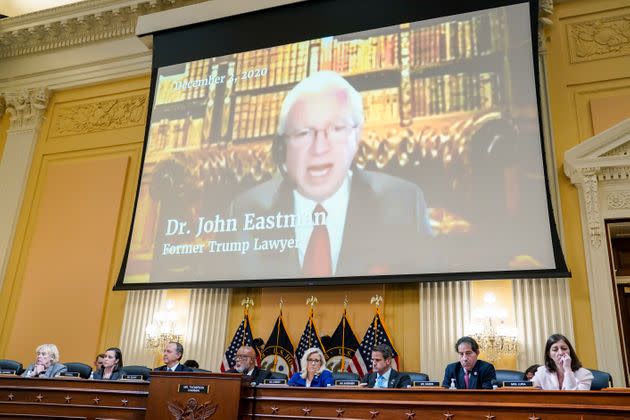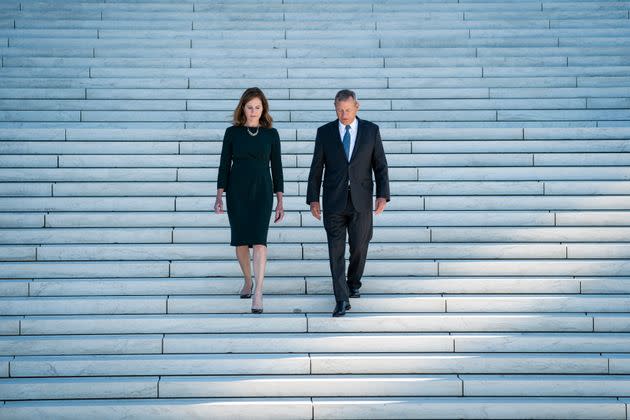Election Lie Supporters Ask Supreme Court To Bless Radical Election Changes
Conservative groups and lawyers who backed former President Donald Trump’s election lies and advised him on how to stay in power despite losing the 2020 election are now asking the U.S. Supreme Court to endorse a radical legal theory that would eviscerate voting rights and protect partisan gerrymandering from all challenges.
The requests came as amicus (“friend of the court”) briefs filed Tuesday in the case of Moore v. Harper. In that case, Republicans in the North Carolina legislature are asking the court to invalidate a congressional district map selected by their state Supreme Court after it ruled the Republican-drawn map was an unconstitutional partisan gerrymander under provisions of the state constitution.
State Republicans want the court to toss the current map by endorsing the so-called independent state legislature theory, which holds that only state legislatures have the authority to adopt congressional district maps and enact federal election laws. Proponents of the theory believe that the elections clause in the U.S. Constitution gives state legislatures the sole authority to set the “time, place, and manner” of elections.
If adopted, the theory would preclude any state-level judicial review of the federal election laws or congressional district maps adopted by state legislatures. That would give state legislatures a free hand to draw partisan congressional district maps in almost whatever way they please since the Supreme Court already cut off federal courts from hearing partisan gerrymandering claims in 2019. It could also enable state legislatures to adopt almost any election law, even if it violated provisions of their state constitution.
“According to proponents of the theory, state legislatures are independent, completely unfettered actors when it comes to regulating federal elections,” Ben Berwick, a counsel at Protect Democracy, a nonpartisan nonprofit that opposes the adoption of the independent state legislature theory. “That is really novel, to put it nicely, and, to put it not as nicely, bunk and completely inconsistent with historical practice and even original understanding.”
This theory found itself before the Supreme Court and its six-vote conservative majority after it was raised by Republicans challenging changes to election procedure approved or made by state courts to accommodate voting in the 2020 election, at the height of the COVID-19 pandemic. These challenges were part and parcel of Trump’s effort to undermine faith in the electoral process ahead of the election and became an important rhetorical cudgel during the post-election effort to overturn the presidential results and then overthrow the government.

Lawyer John Eastman, seen on video during a House select committee hearing on the Jan. 6, 2021, riot at the U.S. Capitol, wants the Supreme Court to endorse a radical theory he leaned on to promote overturning the 2020 presidential vote. (Photo: Jabin Botsford/The Washington Post via Getty Images)
It is no surprise, then, that the many briefs filed in support of the court affirming the independent state legislature theory come from those who participated in the events of Jan. 6, 2021, and promoted Trump’s lies about the 2020 presidential election being “stolen” from him.
“Their ultimate goal is not to vindicate democracy or American constitutionalism; their goal is to eliminate checks and balances on legislatures,” Wolf said. “They don’t want state courts, they don’t want governors, they don’t want state constitutions and they don’t want voters telling state legislatures what to do.”
The reason Republicans would want to greatly empower state legislatures is because so many have already been gerrymandered to exclude the possibility of Democrats winning control of them.
“They see an opportunity to further entrench frankly Republican power ― to empower state legislatures as they stand today are disproportionately weighted towards Republicans,” Berwick said.
Notably, two briefs before the Supreme Court urging it adopt the theory come from lawyer John Eastman. The legal architect of Trump’s effort to overturn the presidential election and a featured speaker at the Jan. 6 rally that precipitated the attack on the U.S. Capitol, Eastman initially pushed for the Republican-controlled state legislatures in Arizona, Georgia, Michigan, Pennsylvania and Wisconsin to submit alternative slates of electors to Congress in support of Trump’s election despite the actual votes of the people of those states. He argued that the Constitution’s electors clause gave uncontested authority to state legislatures to approve and submit electors to Congress.
When no state legislature did as Eastman and Trump wanted, they got the individual GOP electors to submit alternative elector slates to Congress. The process of submitting alternative, fraudulent electors to Congress is now part of the federal investigation into the effort to overturn the election. FBI agents seized Eastman’s phone in June. A federal district judge found that Eastman’s efforts amounted to “a coup in search of a legal theory” and that it was more likely than not that a court would find that he “dishonestly conspired to obstruct the joint session of Congress on Jan. 6, 2021.”
In the brief Eastman submitted for the Claremont Institute’s Center for Constitutional Jurisprudence, he argues that state legislatures have authority over the drawing of federal congressional district maps, just as he argued they have untrammeled authority to select electors.
Though the independent state legislature theory does not provide “a license to coup,” according to Tom Wolf, deputy director of the democracy program at the Brennan Center, a nonprofit that opposes the independent state legislature theory, its adoption could give added rhetorical heft to the next attempt to overthrow the government.
“If the Supreme Court were to give this sort of authority to state legislatures, it’s not clear that the broader public would understand exactly what powers the legislatures are gaining and what they’re not gaining,” Wolf said. “It may become a pretext, or political cover or rhetoric that legislators use to then overturn elections.”
Other briefs from noted supporters of Trump’s effort to overthrow the government come from groups connected to Lt. Gen. Mike Flynn, a former national security adviser, who pushed the military to seize ballots and voting machines and rerun the 2020 presidential vote; Trump adviser Stephen Miller and White House chief of staff Mark Meadows; and lawyer Cleta Mitchell, one of the lawyers arguing for Trump’s election lie who filed a brief with Eastman. (At least one brief, that filed by former U.S. Attorney General William Barr, comes from someone who has spoken out against Trump’s election lies – albeit after he left office.)

Supreme Court Justice Amy Coney Barrett is the only conservative justice who has not stated an opinion on the independent state legislature theory. Chief Justice John Roberts sided against it when the issue came up in 2020. (Photo: Jabin Botsford/The Washington Post via Getty Images)
And then there is the brief filed by the Honest Elections Project, a nonprofit led by Leonard Leo, a co-chair of the conservative Federalist Society and the director of Trump’s Supreme Court selection process, to advocate for restrictive election laws and promote falsehoods about election fraud. Leo raised $250 million to fund the advocacy campaigns for the confirmations of Justices Neil Gorsuch, Brett Kavanaugh and Amy Coney Barrett, whom he helped Trump pick. Leo also raised millions for the advertising campaigns in support of the appointments of Chief Justice John Roberts and Justice Samuel Alito and advised Justice Clarence Thomas during his confirmation hearings.
“Here’s what’s going on in the Supreme Court: The right-wing dark money ‘fictitious name’ front group ‘Honest Elections Project’ is boosting a MAGA theory giving state legislatures virtually unchecked power over federal elections,” Sen. Sheldon Whitehouse (D-R.I.) tweeted on Wednesday. “Remember that the Honest Elections Project is run by Leonard Leo, the Federalist Society Court-packer behind Alito, Roberts and all three of Trump’s Supreme Court picks. Now, he’s trotting out fringe legal theories before the justices he placed.”
This isn’t the first time Leo’s Honest Elections Project has called on the court to endorse the independent state legislature theory. Prior to the 2020 election, when Leo’s group was promoting lies and exaggerations about election fraud, it filed a brief in support of the theory when Pennsylvania Republicans challenged the state Supreme Court’s order to allow ballots mailed by Election Day and that arrived within the next 72 hours to be counted.
The court did not rule in favor of the Republican challenge as it deadlocked in a 4-4 tie. But Alito ordered the ballots that were affected by the state court ruling to be segregated for a possible challenge if, say, the election could be decided by them. But the election was not that close.
At the time, Alito was joined by Thomas and Gorsuch in expressing support for the independent state legislature theory. Kavanaugh stated that he believed the issue should be argued before the court while Roberts sided with the liberal justices.
All of this happened before Barrett joined the court. She now stands as a potential deciding vote on the issue. The case of Moore v. Harper will be argued in the court’s fall term. The court will then decide whether or not to award a big win to supporters of Trump’s election lies and his attempt to overthrow the government on Jan. 6, 2021.
This article originally appeared on HuffPost and has been updated.

 Yahoo Sport
Yahoo Sport 





































